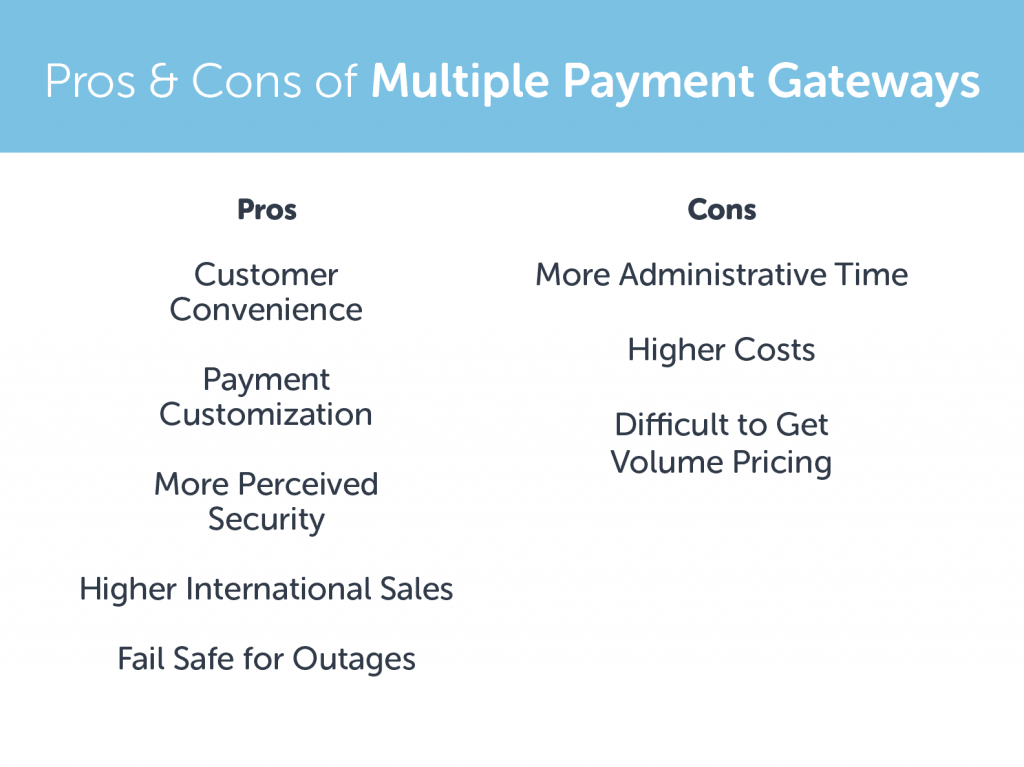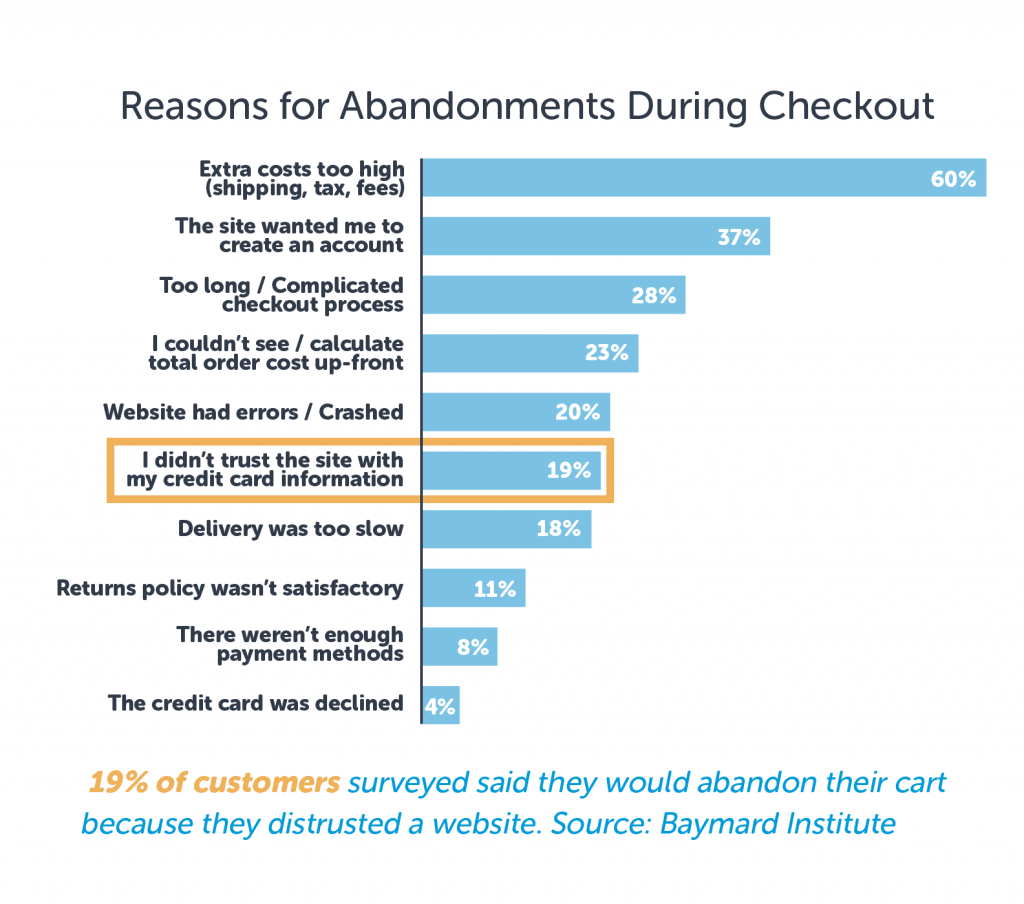The idea of a single payment platform seems smart to many new business owners because it simplifies the process. But having multiple gateways actually offers a ton of advantages that help make your business more profitable.
What are multiple payment options? And are they right for your store? Here are a few pros and cons of multiple payment methods.

Multiple Payment Methods Make Shopping Easier for Customers
When it comes to checkout, you want to make the processes as convenient as possible. Multiple payment methods help. If customers can’t find their preferred payment method, they will abandon their shopping carts.
The Baymard Institute surveyed online shoppers about their reasons for abandoning items in their online cart. The survey found that 8% of people abandoned because there weren’t enough online payment methods available. That percentage represents a healthy chunk of missed sales.

Smart online store owners also create convenience for customers by supporting mobile payments. Retail studies estimate that U.S. sales via smartphone will grow at an annual rate of 18% over the next five years. Smartphones will influence customer buying decisions for more than a third of all U.S. retail sales, or $1 billion.
Millennials and Generation Z both have an affinity for mobile payments, especially payments made through mobile wallets (e.g., Venmo) and mobile payment apps (e.g., Starbucks) that offer loyalty rewards. Take advantage of this trend: Offer at least one payment gateway that offers the convenience of mobile shopping.
Shoppers Can Use Their Favorite Payment Method
Shoppers often prefer specific payment types. One customer may want to build their cash back points with their favorite credit card. Another may only trust an Automated Clearing House (ACH) payment made from their phone. Multiple gateways let you customize more payments for more customers.
Although most online stores accept major credit cards and ACH payments, what you add after this will depend on other factors. What’s right for one store may not be appropriate for another. Here are some questions to ask:
- Are you selling physical products or digital ones?
- Do you sell high-volume, low-cost products or low-volume, high-priced ones? A gateway’s cost per transaction can affect your profit.
- Do the majority of your customers prefer a specific type of payment method? For example, different generations prefer different payment methods.
Answering questions like these help match your products and customer needs to your payment gateway. A good match will customize your shopping experience, lower purchase barriers, and increase sales.
Your Customers Feel Safer Giving You Their Data
Safety in a payment gateway is priority one. After all, that’s a gateway’s main job—encrypting customer data and transmitting it securely. So make sure a payment gateway is PCI compliant before signing on with them. Your customers’ data is your responsibility.
But aside from actual data security, having multiple payment gateways creates a sense of perceived security for your customers. The Baymard Institute survey showed 19% of customers have abandoned their carts because they didn’t trust a site with their credit card information. But having multiple payment gateways helps.
Another survey by YouGov found that 40% of online consumers felt more comfortable buying from a store with multiple payment methods than from stores that offered just one option. That’s a significant uptick in trust.

Having multiple payment gateways signals to customers that you’re trustworthy. The trust attributed to specific companies like PayPal is transferred to you through simple association. The more payment gateways you use, the higher the level of perceived professionalism, legitimacy, and trust.
Multiple Payment Methods Enable You to Make More Money Internationally
If you’re planning on selling internationally, you’ll want multiple payment gateways to support local payment methods. Payment gateways vary by nation, region, and accepted currencies.
For example, Alipay is a favorite payment solution in China. Having a payment gateway that doesn’t support it would cut you off from an enormous market.
If you want to expand into foreign markets, multiple payment gateways help you handle different currencies. Convenience and trust increase when customers can purchase products and services in their local currency. So, you’ll need a gateway that can convert your website’s currency into local ones. Auto-conversion makes the checkout process more convenient. That means lower abandoned cart rates.
Multiple Payment Methods Provide Backup for When (Not If) Your Gateway Crashes
Imagine it’s Cyber Monday and you’re in the middle of a record-breaking sales run. Suddenly, your payment gateway crashes. The gateway company posts an apology, but that won’t help the hundreds of dollars in missed sales you’re experiencing with every passing minute. Your customers take to Twitter and Facebook to complain, your inbox is flooded with customer questions. This scenario is not far-fetched. In fact, payment gateway crashes happen frequently.

Multiple gateways give you a fail safe. If one crashes, you’re able to funnel customers into another. It’s not ideal, but it would certainly beat having no gateway at all. Even if you’re using one payment gateway like PayPal—which gives you access to many others—you’re in the same situation if PayPal goes down.
An extra gateway also records a backup of your customers’ data. When your customers buy from you, your payment gateway records their information so they don’t need to input it for future purchases. Having two or more gateways divides that data among them. You won’t lose it all if data is deleted or destroyed.
Sell your products online, worry-free
Officially recommended by WooCommerce, our hosting is made for online businesses like yours
Downsides to Multiple Payment Methods
There are some extra costs you’ll have with multiple payment gateways. So, check these to see if the strategy fits your business plan.
Higher Costs in Time and Money
When you have multiple gateways, you have multiple contracts, integrations, and setup. That means more paperwork and oversight for you. You’ll have to keep track of—and pay—multiple processing fees, monthly memberships, and transaction costs.
You’ll also need a merchant account for all of your payment gateways so you can receive customer payments. Some gateways like Authorize.NET offer merchant accounts with their services but charge you a higher monthly fee for the service.

All of this extra headache is why many new business owners choose a combined payment processor like Stripe or PayPal. Both let you accept many forms of payment and include an aggregated merchant account, which combines your funds with other merchants. These accounts are easy to start up and have fewer monthly fees. However, their cost per transaction rate is higher.
Getting Volume Pricing Is Harder
Payment gateways have volume pricing plans, lowering your rate if you sell more often. Breaking into a high sales bracket to lower your costs is easier when you have a single payment gateway. But when you split your sales among multiple payment gateways, it takes more to reach the same sales volume goal.
Volume pricing isn’t something most new business owners consider, but it is something to think about for the future of your store.
Features You Need in Multiple Payment Methods
Multiple payment gateways bring many benefits for your customers and store. But you still need to find payment gateways that fulfill your business needs. Here are a few payment gateway features that will benefit your business.
Mobile-Friendly
Since the future of ecommerce is mobile, find a payment gateway with mobile payment options. Square offers mobile checkout via an app. Plus, mobile-friendly gateways like Square also help you diversify your sales opportunities. With Square’s mobile point-of-sale feature, you can take payment at physical locations like fairs or pop-up shops.
Website Integration
With payment gateways like PayPal, you can choose between letting your customers check out on your website or on PayPal’s site. The difference seems small, but it has big implications for your customer’s checkout process.

For one, when customers checkout on PayPal’s platform, you lose control over the buying experience at the moment of purchase. The branding of your site is replaced with a PayPal popup window. You can’t upsell or recommend other items after a customer leaves your site to pay. This can cost you potential sales. But PayPal is convenient for new customers who already have their payment information saved in the payment gateway’s system.
Recurring Payments
For store owners who sell memberships, subscriptions, and access to exclusive content, recurring payments helps simplify their lives and increase their sales. Some payment gateways, like Payflow and Stripe, can be set up to automatically charge customers’ credit cards at predetermined intervals (e.g., daily, monthly, yearly). Recurring charges help retain customers who might otherwise forget to renew their memberships and subscriptions. That means more sales and less hassle for you.
Reporting
Look for a payment gateway that generates sales reports for you or integrates with your bookkeeping software. To increase sales, you need to identify popular products, big-spending customers, and seasonal sales trends. This data allows you to promote the right products to the right people at the right time. You can also use reporting features like those offered by Braintree to view and resolve your customers’ refunds, chargebacks, and disputed transactions.
Payment Gateways Don’t Just Process Payments
As a critical part of your customers’ purchase journey, payment gateways do more than just receive, store, and transmit your customers’ data. They say something about your website. When choosing one, name brands matter. If customers don’t recognize your gateway, they’re less likely to trust it … and you.
Therefore, payment gateways are really a part of your branding. They communicate something about your company, how you treat your customers, what you value. They’re as important to your store’s personality as your brand name, color scheme, logo design, product page, or other design element. So, choose wisely. Consider more than just convenience or getting started quickly. If your business model is a good one, you’ll have the future to consider, too.
WooCommerce is Compatible With Over 100 Payment Gateways
With Managed WooCommerce Hosting from Nexcess, you get a platform managed by experts in hosting online stores, fast store speeds with Astra theme, Beaver Builder for landing pages, IconicWP for premium plugin features, and much more.
Start Your Ecommerce Business With More Advantages
A successful transaction is harder to come by when your site isn't performing well. Managed hosting from Nexcess ensures your site is fast and you have the tools you need to ensure a smooth customer experience.
These managed hosting solutions offer support and a wide range of features, like cart abandonment software so you can email customers who didn’t complete an order. Plus, hosted solutions like ours are made to be fast and great for SEO.
Thinking about starting a new store or migrating your existing store to a fast, secure host? Check out our Managed WooCommerce plans today.

